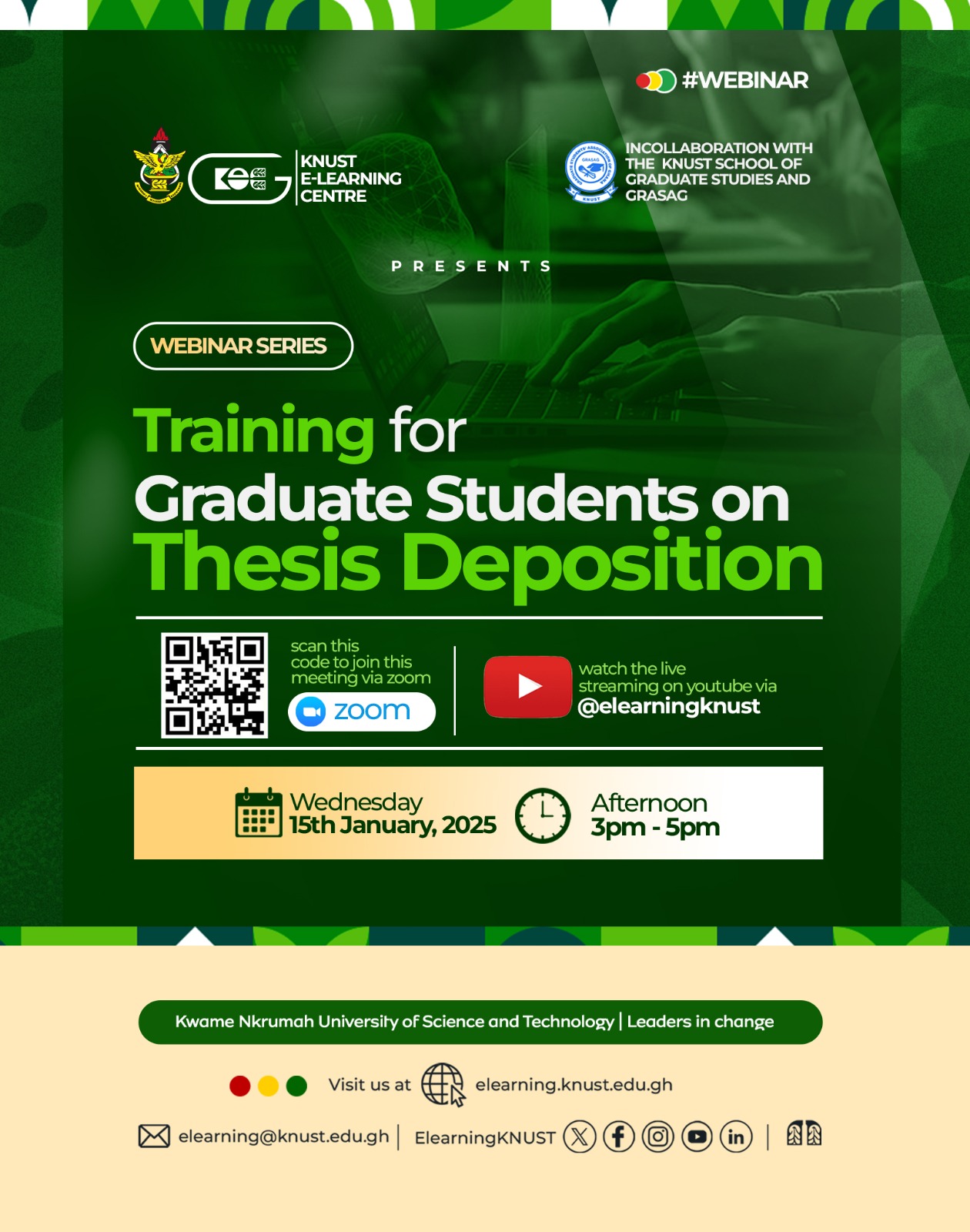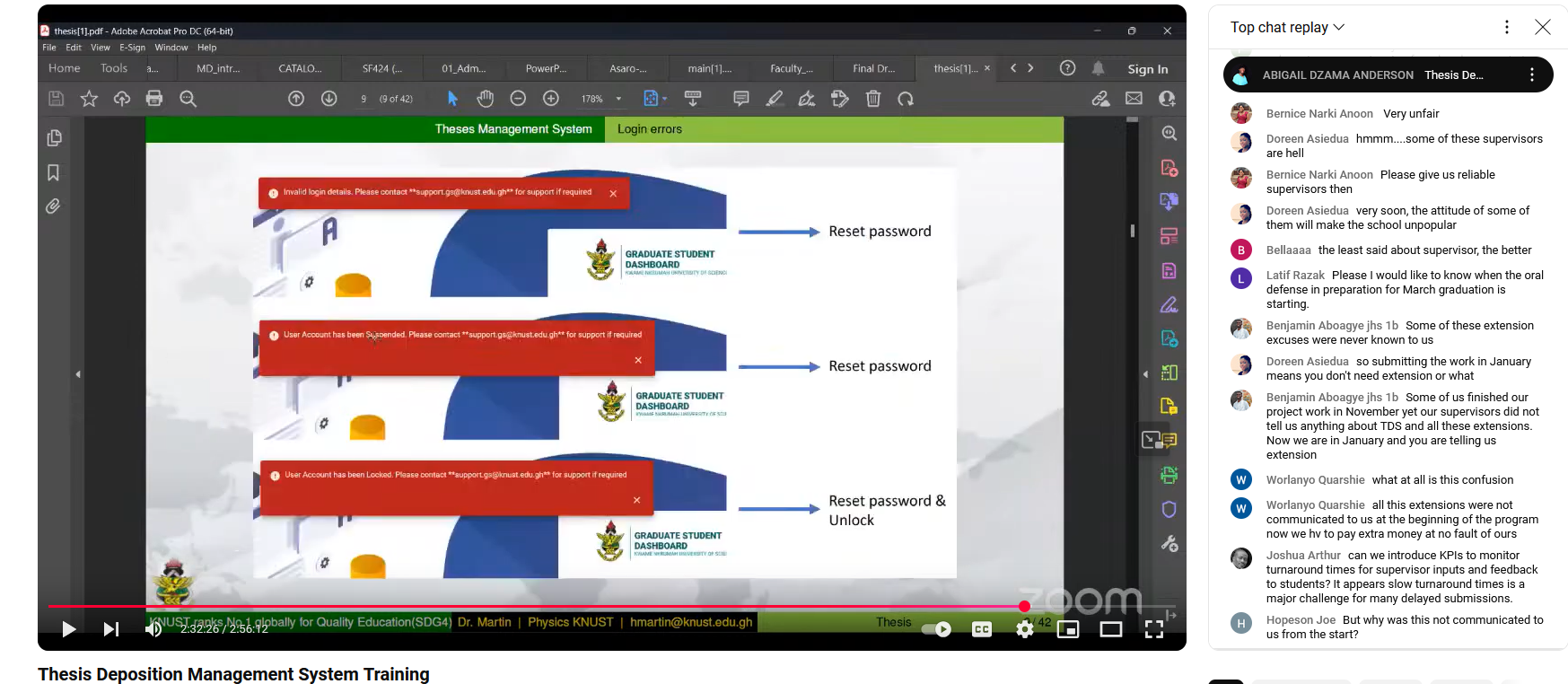KNUST E-Learning Centre Trains Graduate Students on Thesis Deposition Management System
The KNUST School of Graduate Studies, in collaboration with the E-Learning Centre and the Graduate Students Association of Ghana (GRASAG), has organized a training session for graduate students on the Thesis Deposition Management System. The virtual training brought together over 1,000 students, faculty, and administrative staff to streamline the thesis submission process and address common challenges encountered during graduate studies.

Simplifying thesis submission
The Director of the KNUST E-Learning Centre, Professor Eric Appau Asante, emphasized the need for training to ensure smooth adoption of the Thesis Deposition Management System. According to him, the system simplifies the process of thesis submission but requires users to understand its dynamics. “The system makes it easier for students and faculty to collaborate. Once you graduate, there is no need to return to resolve issues related to your thesis. This requires training for students, faculty, and staff to fully understand the process,” Professor Asante said.
He highlighted that the E-Learning Centre has been releasing resources to support students and faculty. He assured participants that the system’s structure would help students graduate without unnecessary delays.
Requirements for thesis submission
During the session, participants were taken through the requirements for thesis submission. These include completing and passing all taught courses, obtaining a Cumulative Weighted Average (CWA) of 55% or above, registering for the final academic year, and having an assigned supervisor approve the thesis for submission.
For students whose program duration has elapsed, additional steps include registering for a grace period, submitting an extension request, and paying an extension bill. Dr. Henry Martin from the Department of Physics outlined the framework of graduate studies at KNUST. He explained that graduate students operate within three levels: the local environment, departmental level, and the School of Graduate Studies.

Collaboration and support
Dr. Martin mentioned the importance of collaboration within the local environment. “Your first point of contact should be your colleagues, supervisors, or course lecturers. If you encounter challenges, the graduate coordinator and head of department are available to assist you,” he explained.
He also highlighted the role of the School of Graduate Studies in providing overall academic guidance. “The school’s framework is structured to ensure every student has access to the support they need,” he said. Insights from GRASAG Gabriel Alexander Kpevu, the President of GRASAG-KNUST, advised students to exercise patience and utilize the resources available.
“The thesis submission process is straightforward once you understand it. This training will help everyone navigate the system with ease. For those who couldn’t join, the recorded session will be made available online,” he said. Alexander encouraged students to share their knowledge with peers to ensure that everyone benefits from the training.
“This training is in the best interest of all graduate students. Let’s support one another and make good use of the resources provided,” he added. Online and hybrid delivery The training was delivered via Zoom and streamed live on YouTube to accommodate the large number of participants.
Organizers assured students that the recorded session would be uploaded to an accessible platform for future reference.
A unified approach to graduate studies Participants were introduced to the organogram of the School of Graduate Studies, which includes academic boards, coordinators, and administrative staff. Dr. Martin explained how these levels interact to provide support and guidance throughout students’ academic journeys.
“Graduate studies involve collaboration at multiple levels. Understanding how these levels work ensures that you can seek the right help at the right time,” he said.
Professor Asante expressed gratitude to GRASAG and the School of Graduate Studies for organizing the training. He encouraged students to stay focused and take advantage of the system’s benefits. “By following the guidelines and using the resources available, you can complete your thesis and graduate successfully,” he said.
Published: 17th January,2025 Source: KNUST E-Learning Centre
